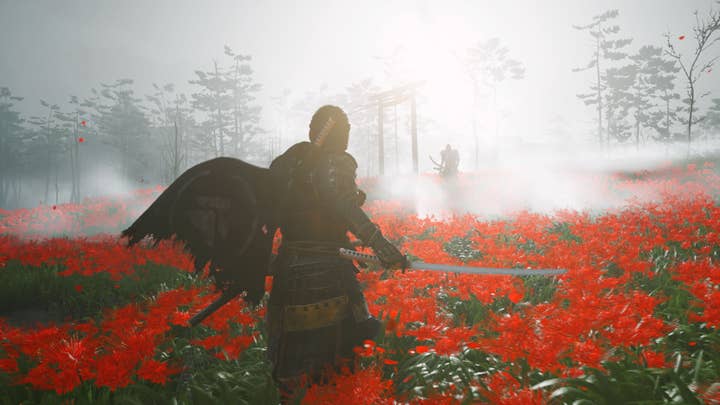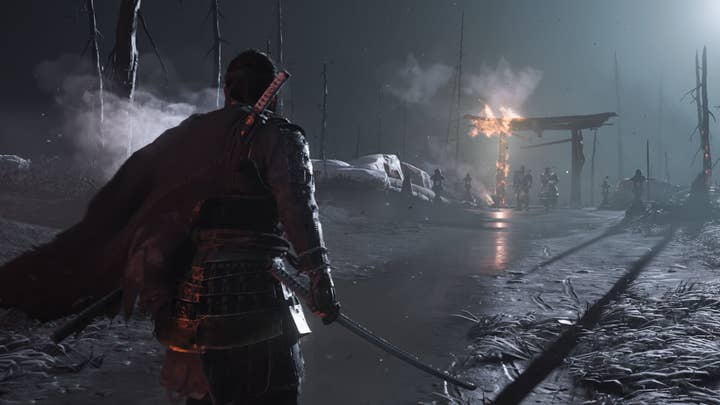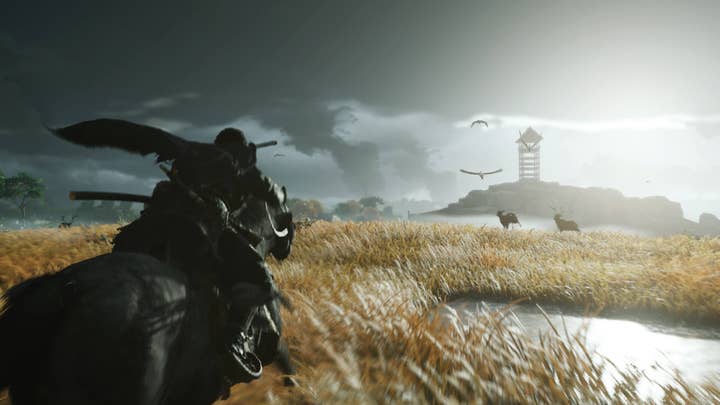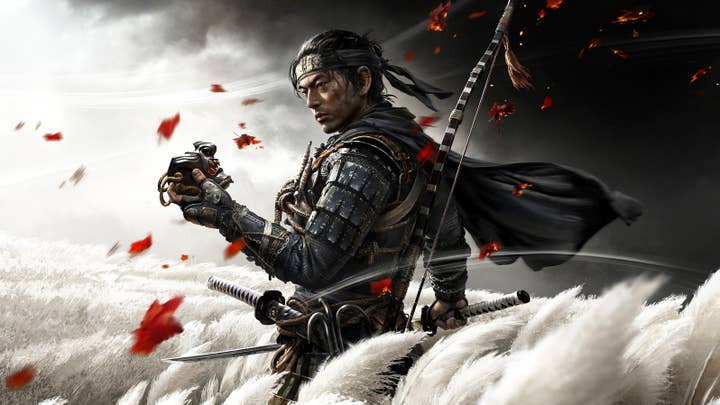Ghost of Tsushima: Critical Consensus
Critics says PlayStation's latest is a visually stunning adventure held back by ageing open-world design and mechanics
As we approach the beginning of a new console generation, it is perhaps natural to expect the last remaining blockbusters to represent the pinnacle of the current one, showcasing the biggest innovations and advances of the past seven years.
It's disappointing, then, to read such mixed reviews for Sucker Punch's Ghost of Tsushima, potentially the PlayStation 4's last hurrah.
The Metacritic rating currently stands at a respectable 84, but read through the critique of this week's big release and the words "repetitive," "bloated," and "overly safe" are just as common as praise for its visuals. Another running theme is that, while the title builds on the examples set by similar titles, it does little to advance on what has already become a tried-and-tested formula.
As VG247's Kirk McKeand phrases it in his three-star review, Ghost of Tsushima "[is] Open World: The Video Game."
"A samurai is trained from a young age to keep their emotions in check, which is fitting because Ghost of Tsushima barely made me feel anything at all"
Kirk McKeand, VG247
Sucker Punch's title is set on the titular Japanese island in 1274, the year of the first Mongol invasion of Japan. Players take on the role of Jin Sakai, the last surviving samurai who must fend off the invaders, who are led by Genghis Khan's fictional grandson, Khotun.
Some reviewers have plenty of praise for Jin and the cast of characters around him, with the story described as a fine homage to the classic samurai cinema that inspired it. But while the presentation, including the black-and-white Kurosawa mode -- named for the Japanese film director Akira Kurosawa, famous for his samurai films -- is well executed, it's let down by the ludonarrative dissonance created by the gameplay.
"One minute you're calling people out for honourable duels and the next you're stabbing them as they sleep," McKeand writes. "Ghost of Tsushima attempts to moralise over this shift, but there's no escaping your fate. As a player, the only thing going through your mind will be how to take out the enemy as efficiently as possible.
"A samurai is trained from a young age to keep their emotions in check, which is fitting because Ghost of Tsushima barely made me feel anything at all. It doesn't help that the story is so sparse, bogged down by busywork."

The highest praise for the game is unquestionably for its artistic and visual style. In his unscored review for GQ, Sam White says he struggles to remember the last game in which he spent more time taking photos than actually playing.
"Every sight is stunning - be it an orange sunset across a war-ravaged coastline, the moonlit peaks of a mountain range or the rain-battered canopies of the world's dense forests - and every vista begs to be captured," he writes.
"Ghost of Tsushima offers a lovely world to explore, and there's value in that, but it should have been so much more than a checklist of activities to accomplish"
Carolyn Petit, Polygon
"The game makes this possible with a photo mode expanded beyond any game I've played before. It lets you tweak all the usual settings while also animating the environment, changing weather and time of day manually and even creating your own mini-films by panning the camera into different positions. I spent far too long getting the composition right on a particularly beautiful night, where fireflies had gathered in the air to shimmer gold against the midnight-blue sky. Like the wonder of Breath Of The Wild, Ghost Of Tsushima has a naturalistic beauty that few games have nailed."
The visual impact of the game is aided by some innovative alternatives to the usual screen-clogging user interface. Using the PS4 controller's touchpad sends a gust of wind, the direction of which indicates the route to your next objective or waypoint. Secrets, treasures and side activities are teased by the chirping of a golden bird you must follow, rather than immersion-breaking markers.
In her three-star review for The Guardian, Keza MacDonald describes these systems as "elegant solutions" that are a welcome change from "little icons and mini-maps cluttering up the screen and making you feel like you're playing a satnav."
But Polygon's Carolyn Petit reports that the sheer number of golden birds -- leading you to hot springs, platforming sections, artifacts, charms, banners, masks and a myriad other collectible icons -- takes away from the subtlety of this design and ultimately the enjoyment of the world itself.
"Ghost of Tsushima is overeager, desperate even, to constantly make me feel rewarded or to show me that I'm making meaningful progress," she writes in her unscored review. "This eats away at my ability to see the world of the game as a world rather than as a collection of things to do and grab and earn."

Petit adds that if you follow every teaser the game throws your way, it soon becomes clear that many of the challenges, experiences and activities are largely the same, feeling like "cookie-cutter bits of consumable content rather than opportunities organically nestled in the environment you're exploring."
It's an issue that also applies to the scenery, according to Jon Bailes' three-star review for VGC: "For all its beauty, the environment in Ghost is absent a sense of mystery. There are few major landmarks, while villages and outposts are furnished with copy-pasted structures.
"Ghost of Tsushima sticks so closely to the tropes and storylines of classic samurai fiction that it sometimes forgets to have a personality of its own"
Keza MacDonald, The Guardian
"And although there's distinct scenery for each of the island's three regions, it is just that - scenery. Some rudimentary climbing aside, there's no need to consider your terrain, nor will you stumble upon hidden cavernous interiors to mine for treasures. Exploration misses the diversity of Horizon: Zero Dawn's world or the architectural wonders of recent Assassin's Creed games."
Fortunately, the main missions offer more variety, ranging from one-on-one duals to large-scale battles and even some infiltration sections. But it's here that comparisons with past games emerge once more, as these sections polish older ideas rather than offering new ones.
VG247's McKeand offers a checklist: stealth missions you can instantly fail, some where your equipment is removed and you must rely only on stealth, other missions where it's game over if you leave a certain area, conveniently-placed explosive barrels -- all experiences that players have been enjoying for at least a decade.
GQ's White highlights an "unexciting stealth section" where you must follow a character from a safe distance: "Assassin's Creed was doing this stuff in 2007. Thirteen years later, there's not much excuse for this being the starting point of a huge-budget, beautiful open-world PS4 exclusive."
He adds that stealth is unremarkable with no cover system, dated AI and "too much repetition to keep things interesting" -- disappointing comments for a game where the prospect of being as elusive as a ghost is literally in the title.

The combat fares much better. A focus on well-timed attacks and an upgrade system that makes you nigh unstoppable by the end of the game was a major selling point for some critics.
VGC's Bailes writes: "In tune with Jin's controlled samurai training, every fight in Ghost is a dance of measured ferocity, demanding bravery but punishing recklessness. Last-second parries are rewarded with instant kill ripostes, retaining perfect poise before sweeping fluidly into the next precise slash or stance shift. Vanquished foes are left standing, momentarily unaware of their own demise, before slumping in your wake."
Yet for all its flair in battle and beauty in the field, there's a consensus that Ghost of Tsushima lacks a sense of identity, something to make it stand out from other open-world titles or games that blend stealth and action. Comparisons with Assassin's Creed were inevitable, and not always favourable.
"Unlike Assassin's Creed, which always uses its historical settings as stages for its own eccentric stories, Ghost of Tsushima sticks so closely to the tropes and storylines of classic samurai fiction that it sometimes forgets to have a personality of its own," The Guardian's MacDonald concludes. "After I caught myself repeatedly checking my phone out of boredom during the story missions, I decided to abandon them entirely for a while and had a great time chasing foxes, bathing in hot springs, composing deeply average haiku and climbing mountains in search of a legendary bow instead."
Polygon's Petit adds: "Ghost of Tsushima offers a lovely world to explore, and there's value in that, but it should have been so much more than a checklist of activities to accomplish."

